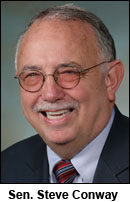STATE GOVERNMENT
‘We got so much done in 60 days!’
Labor chairs Sen. Karen Keiser and Rep. Liz Berry reflect on 2024 legislative wins for working families. They say none of it would’ve been possible without you.
OLYMPIA (May 10, 2024) — In the 2023-24 biennium, for the first time in state history, two women served as labor committee chairs in both houses of the Washington State Legislature: Sen. Karen Keiser (D-Des Moines) in the Senate Labor & Commerce Committee and Rep. Liz Berry (D-Seattle) in the House Labor & Workplace Standards Committee.
Both have proven to be strong champions of pro-worker legislation and have succeeded in passing dozens of bills supported by Washington’s union movement. The STAND met with Keiser and Berry — on May Day! — to talk about some of the progress achieved in this year’s “short” 60-day session and what their hopes are moving forward.
A wonderful final bill
Right at the top of Keiser’s list of 2024 accomplishments was the Employee Free Choice Act (SB 5778). Effective June 6, Washington workers will gain protection from retaliation if they choose not to participate in “captive audience” meetings where they are required to listen to the employer’s opinions on religious, political or union matters.
“This was my top priority and I’m very happy that it got passed into law,” said Keiser, the bill’s prime sponsor.
Its passage was particularly meaningful because, after 29 years in the Legislature, Keiser has announced she is retiring at the end of the year and she got to watch Gov. Jay Inslee sign this, her final bill, in her legislative district.
“That was so wonderful,” she said. “It was a fantastic showing from the whole labor community in South King County, so it was terrific that the governor could make his way to Kent and the IBEW 46 Hall. It was my last bill and I feel very gratified that it was done in such a gracious way.”
Among the other 2024 victories Keiser cited were:
▪ HB 2266, a top priority of the building trades sponsored by Rep. Monica Stonier (D-Vancouver), which requires the Department of Labor and Industries to develop rules for employers in the construction industry to provide better and sanitary conditions for workers who menstruate or express milk, or both.
 ▪ Sen. Steve Conway’s (D-Tacoma) SB 6007, which will protect grocery store and grocery distribution center workers and communities from the negative impacts of corporate megamergers in the grocery industry, like the one under consideration between Kroger and Albertsons.
▪ Sen. Steve Conway’s (D-Tacoma) SB 6007, which will protect grocery store and grocery distribution center workers and communities from the negative impacts of corporate megamergers in the grocery industry, like the one under consideration between Kroger and Albertsons.
▪ SB 6194 by Sen. Derek Stanford (D-Bothell) clarifying elements of legislative staff collective bargaining policy, including preserving staffs’ ability to negotiate over just cause and overtime.
▪ Some important pro-worker bills that didn’t pass through labor committees, such as the HB 1368 (Senn) to help Washington make the transition to zero-emission electric school buses and the Buy Clean Buy Fair Act (HB 1282, Duerr). Plus, significant budget investments in apprenticeship and in job-creating clean-energy policies funded by the Climate Commitment Act.
Marching ahead to fight pay discrimination
 Berry echoed her enthusiasm for the above-mentioned bills, and she was also excited about Sharlett Mena’s (D-Tacoma) HB 1905, which expands the state’s wage discrimination protections to apply to all protected classes. It will ensure that workers have recourse if they face pay discrimination related to their race, age, sexual orientation, national origin, physical disability, and other protected classes.
Berry echoed her enthusiasm for the above-mentioned bills, and she was also excited about Sharlett Mena’s (D-Tacoma) HB 1905, which expands the state’s wage discrimination protections to apply to all protected classes. It will ensure that workers have recourse if they face pay discrimination related to their race, age, sexual orientation, national origin, physical disability, and other protected classes.
“A few years ago, passing the original bill for just gender pay discrimination was like a World War III fight,” Berry said. “Now just a few years later we’ve added all protected classes without too much heartburn. I think that shows how much the movement is marching ahead as times change, which makes me very proud.”
Another successful bill that was personally important to Berry was HB 2382, which authorizes death benefits for families of rideshare drivers who are killed on the job, even if they are between trip requests when killed. There have been five rideshare drivers killed on the job in Washington since 2020.
“This is incredibly important to those workers, many of whom are immigrants and refugees who are the sole breadwinners of their very large families,” Berry said.
Berry also mentioned successful passage of:
 ▪ SB 5793, sponsored by Sen. Rebecca Saldaña (D-Seattle) and Rep. Mary Fosse (D-Everett) in the House, which makes an important update to Washington’s paid sick leave law by allowing workers to use paid sick time to care not only for close biological relatives, but also for extended family as well as chosen family. This was a huge win for families with diverse, non-nuclear family structures which are more likely in LGBTQ+, immigrant, and BIPOC communities.
▪ SB 5793, sponsored by Sen. Rebecca Saldaña (D-Seattle) and Rep. Mary Fosse (D-Everett) in the House, which makes an important update to Washington’s paid sick leave law by allowing workers to use paid sick time to care not only for close biological relatives, but also for extended family as well as chosen family. This was a huge win for families with diverse, non-nuclear family structures which are more likely in LGBTQ+, immigrant, and BIPOC communities.
▪ HB 2022, sponsored by Rep. Julia Reed (D-Seattle), updates safety and permitting requirements around the assembly and disassembly of construction cranes, in direct response to the tragedy in South Lake Union five years ago.
▪ The dancers’ bill of rights extending critical workplace safety protections to adult entertainment workers.
A heartbreaking disappointment
One of the bigger 2024 disappointments was the failure of HB 1893 to pass. Sponsored by Rep. Beth Doglio (D-Olympia) and Keiser in the Senate, this bill would have authorized unemployment insurance for striking workers for up to four weeks following a two-week waiting period. Already authorized in New York, New Jersey and Maine, this policy would have limited the impact of a long-held employer strategy of starving workers out during contract disputes.
HB 1893 passed the House on a 53-44 vote. Thousands of workers subsequently made their voices heard in support of HB 1893 at a Feb. 28 rally and via phone calls, emails, notes, and other communications to senators. But in the end, the bill didn’t get a Senate vote because all Republicans and a handful of Democrats opposed it.
“My heart is broken about unemployment insurance for striking workers,” Keiser said, “but I am sure that will pass next year because the votes that were not in our camp will be gone next year.”
She did note that her bill SB 5632 was approved, which provides striking workers access to health care through the state’s HealthPlanFinder exchange.
“It may seem like a modest thing, but we have a public plan now at a very reasonable cost so you can get health insurance with good coverage,” Keiser said. “And when you’re on strike you don’t have any income so (with the subsidies) it could be as little as $10 or $20 a month for your premium.”
Keep showing up
Berry said Keiser has been her mentor as a labor committee chair.
“Karen is a force of nature,” Berry said. “She understands labor issues inside and out better than anybody, I think, in the Legislature. And she has the remarkable ability of zeroing in on exactly what the problem is going to be and bringing people to the table to try to get to compromise and get important policies passed. I’ve learned so much from her.”
“We have a really good cross-Rotunda conversation,” Keiser agreed. “Having that kind of coordination is somewhat unusual because a lot of times there’s competition between chambers.”
That coordination led to some major victories in 2024, but both Keiser and Berry were quick to point out that none of it would have been possible if not for you.
“We got so much done in 60 days,” Berry said, referring to the sheer volume of bills in 2024. “But this isn’t just me and Karen and the members of our committees, it’s the entire Washington state labor community that helps us be so successful.”
She added:
“I just want to say — to all the community members who make up the Washington State Labor Council and who read The STAND — how much your advocacy matters and what a powerful collective force your community is in Olympia, and to keep encouraging everyone to think big and think bold on what we can do in policy work and budget work to support working families. Keep showing up. Because that’s what makes the difference, when legislators hear from you directly about how these policies affect your lives.”
 For more information about the fate of pro-worker legislation this year, and how lawmakers voted on these critical bills, check out the 2024 Legislative Report and Voting Record of the Washington State Labor Council, AFL-CIO.
For more information about the fate of pro-worker legislation this year, and how lawmakers voted on these critical bills, check out the 2024 Legislative Report and Voting Record of the Washington State Labor Council, AFL-CIO.










